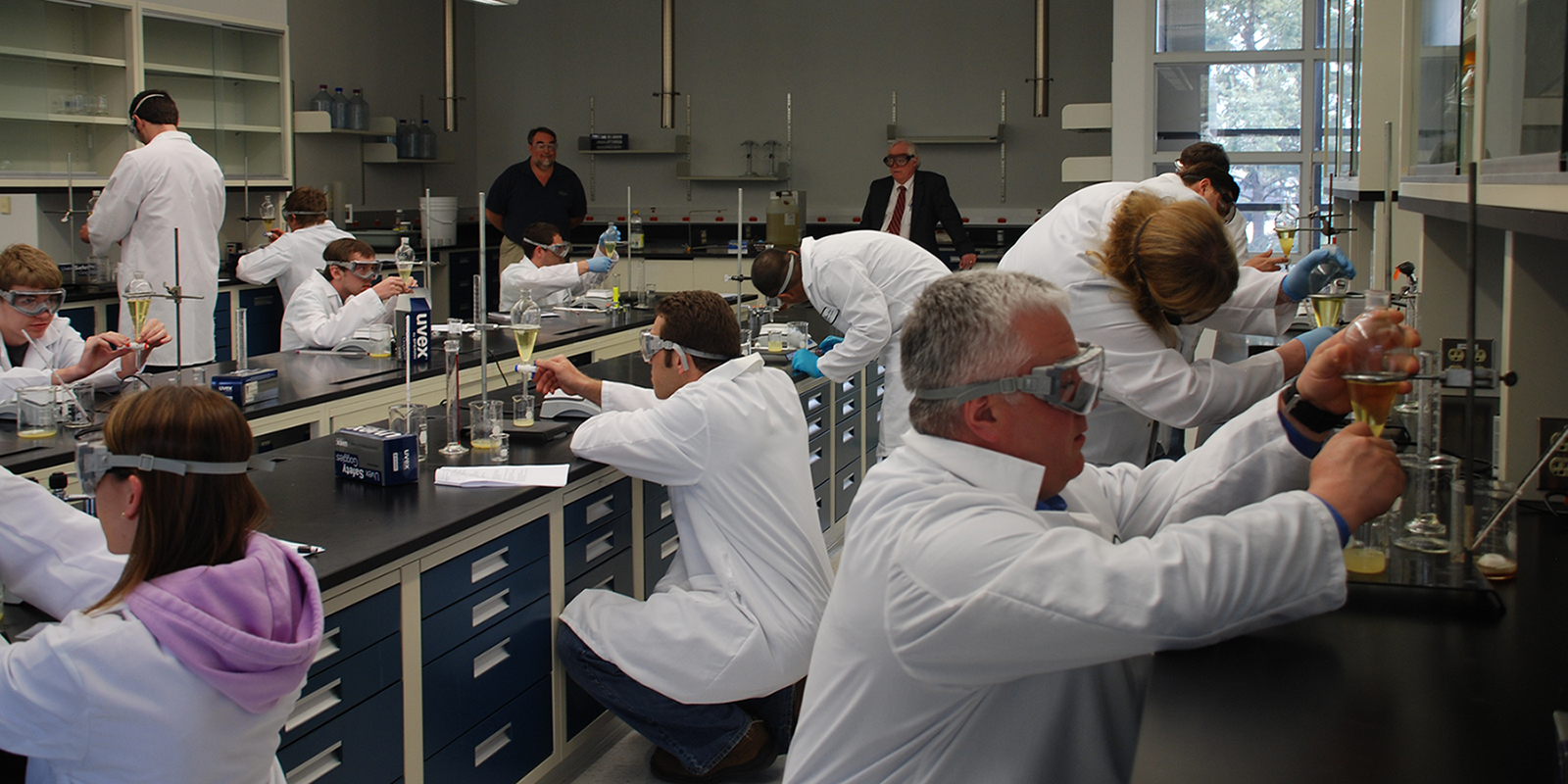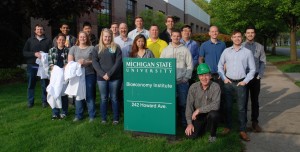Workshop Offers ‘Production-Sized’ Chemistry Experience

Chemistry at the Michigan State University Bioeconomy Institute in Holland, Mich., comes in all sizes, from a beakerful of biofuel in one of the facility’s many modern laboratories, to giant batches of it in the 4,000-liter reactor/stills in its pilot plant. And every spring, a small group of ‘students’ – entrepreneurs, teachers, and chemical industry professionals, as well as college students – in the week-long “Lab Bench to Pilot Plant” workshop, get to handle all of it.
Next Lab Bench to Pilot Plant Workshop
May 22-26, 2017
The workshop effectively joins the institute’s dual mission of education and economic development by introducing experienced and novice lab chemists to the practical challenges of the scaling-up process, helping them to understand green chemistry in a very real setting.
According to Devinda Pankaja Wijewardena, a chemical engineering junior from Michigan State, “The class … gave me an insight into how I could bridge the differences between research and development when I am working on research in the future, as there are numerous differences in processes when a product is carried from the lab and developed into a commercially viable product.”
Another Michigan State chemical engineering student who participated in 2016, sophomore Mark Elinski, valued the experience in terms of preparing him for a role in industry. “This was my first time doing chemistry outside of a laboratory setting on a large industrial scale,” he says. “I loved working with all of the industrial equipment, and scaling up chemical processes is what many chemical engineers do on a daily basis. The workshop gave me a good taste of what my future career could look like.”
Super-Sized Chemistry
Along with an emphasis on safety, keeping meticulous batch records, and the importance of checking and double-checking details throughout the process, the workshop gives the participants a healthy respect for the sheer size of production in a chemical plant.

Participants from the 2016 class.
“I was mostly surprised – and impressed – with the size and complexity of the pilot plant,” says Eliniski. “All of the gas and waste lines were like a maze around the plant, and the reactors we worked with were massive. I was also surprised at how reactants and products are pumped around the industrial facility.”
He contrasts the pilot plant scale-up with his lab experience. “In a lab, you can just pour one beaker of reactants into another and mix them with a glass rod. In an industrial plant, reactants have to be sucked from large drums into the huge reactors with a vacuum. Then, the reactants can be mixed with large agitators at the bottom of the reactors.”
One of this year’s participants, Michael Seymour, professor of chemistry at nearby Hope College, couldn’t agree more. “While I have participated in and taught many hands-on workshops, the scale and scope of this workshop were quite different. The concept of adding a reactant using a graduated cylinder in the academic lab versus adding a 55-gallon drum of reactant in the plant took on real meaning after actually transferring a drum of reagent into a 4000-liter reactor.”
As a college teacher himself, Seymour appreciated the opportunity to be on the other side of the bench. “It seemed to be a good mix of lab work and classroom presentations,” he says. “All the presenters and team leaders were well prepared and enthusiastic about working with us.”
Al Jensen, pilot plant manager and a team leader for the workshop, says that seven years ago, when the operations staff first developed the curriculum, none of the veteran operations staff had ever taught a course before. “I think it has been an opportunity for us to step out of our comfort zones and become teachers. I am sure that I speak for all of us who are involved, that it is something we look forward to now, and enjoy the interaction with participants.”
Support for Economic Progress
Jensen also emphasizes that class participants need “to see the real, practical challenges that it takes to make money in the industry.” And he should know: His pilot plant is only a classroom for one week a year – the rest of the time it is a very real environment for established companies and striving entrepreneurs who have come to the institute for its academic and industry expertise.
In conjunction with West Michigan’s economic development organization, Lakeshore Advantage, the institute has fostered several successful projects since it was donated to MSU by Pfizer in 2009, scaling up more than 20 different technologies from the lab to the pilot plant. Some of the companies that have had projects at the facility include DuPont, Genomatica, Verdezyne, OPX BIO, Amyris, Novozymes, Marrone Bio Innovations, Metabolix, and Tepha Medical Devices.
In recognition of institute’s potential to support economic growth, in 2011 the MSU Bioeconomy Institute received one of six national grants for an “i6 Green Challenge” Proof of Concept Center. Along with Lakeshore Advantage, the NewNorth Center for Design, and the Prima Civitas Foundation, the institute provided several types of business services for emerging companies over the years of the grant.
Register now for the 2017 Lab Bench to Pilot Plant Workshop!

